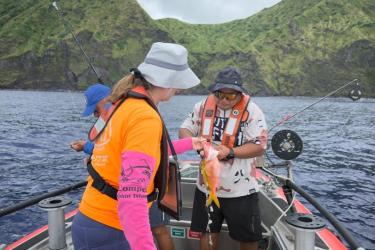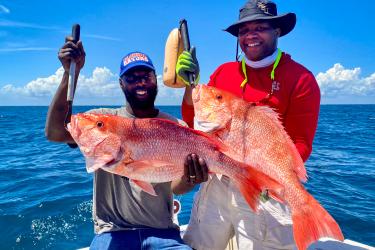To support our efforts to restore resilient coral ecosystems, NOAA is recommending approximately $1.43 million in fiscal year 2021 funding. The funding will support seven projects through the Ruth Gates Coral Restoration Innovation Grants opportunity. The projects aim to enhance coral resilience and improve the long-term success and efficiency of shallow-water coral reef restoration in a changing climate.
Globally, coral reefs are rapidly declining in health. While coral restoration efforts have been successful at a local level, the development of innovative interventions are needed. They will improve the efficiency and long-term effectiveness of coral restoration activities in order to restore resilient, genetically diverse, and reproductively viable coral populations at a larger scale.
Projects will enhance research and development of interventions to improve coral resilience to environmental stressors. They will also support novel techniques to improve the efficiency and effectiveness of coral population enhancement.
We recommended three new projects for funding:
- SECORE International, Inc. will test self-stabilizing coral outplanting substrates in the University of Miami’s SUSTAIN tank (SUrge-STructure-Atmosphere INteraction), a wind-wave simulator, to refine the substrate design to improve retention in a natural environment
- The Florida International University will investigate the feasibility to improve restoration and enhance coral resilience by attempting to make corals withstand increased temperatures
- The University of Southern California working with the Mote Marine Laboratory will quantify the thermal tolerance of nursery-reared elkhorn corals and identify genomic signatures associated with key thermal resilience traits
We recommended four continuing, multi-year projects for funding:
- The University of Hawaii will address a knowledge gap in coral-assisted evolution by assessing how selectively bred corals can increase adaptation in natural reproduction by improving the temperature tolerance of future coral populations
- The University of Miami will assess the feasibility of increasing the genetic diversity to restore elkhorn coral populations in Florida by cross breeding corals with Northwest Bahamas corals
- Johnston Applied Marine Sciences will test a new settlement substrate for coral larvae in order to scale up coral restoration efforts through the outplanting of sexually derived juvenile corals and build capacity in the Commonwealth of the Northern Mariana Islands to implement coral sexual propagation
- Pennsylvania State University will analyze four coral species in the U.S. Virgin Islands to understand genetic and molecular mechanisms related to thermal tolerance and resilience
This Ruth Gates Coral Restoration Innovation Grants opportunity is tribute to the work and life of Dr. Ruth Gates, former Director of the Hawaii Institute of Marine Biology and renowned coral researcher. The competition in direct response to the National Academies of Sciences, Engineering, and Medicine study on Interventions to Increase the Resilience of Coral Reefs.




